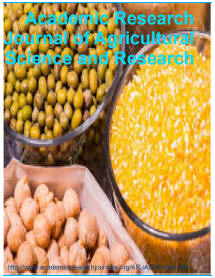| ARJASR |
Academic Research Journal of
Agricultural Science and Research |
||||||||||||||||||||||
|
Academic Research Journal of Agricultural Science and Research Vol. 4(4), pp. 154-163. July, 2016. ISSN: 2360-7874 DOI: 10.14662/ARJASR2016.019
Full Length Research The Implication of Wood-Burning Stove Efficiency for Environment, Health and CO2 emissions in the Jogo-gudedo Watershed, Ethiopia
Abera Assefa Biratu
Ethiopian Institute of Agricultural Research, Melkassa Agricultural Research Center, P.O. Box 436 Adama, Ethiopia
Accepted 5 July 2016
Biomass energy
is a major source of rural energy in Ethiopia. The heavy reliance on
biomass energy has become a major cause of land resources degradation
and a contributor to greenhouse gases (GHG) emissions. Fuel wood energy
consumption can be reduced with efficient stoves. This research was
conducted in the Jogo-gudedo Watershed, Ethiopia aiming to evaluate the
performance of stoves and investigate the Households (HHs) biomass
energy source and consumption. The HH fuel wood consumption and
performances of the stoves was studied using experimental measurement,
controlled cooking test (CCT), questioner survey and participatory
demonstration and evaluation methods. Improved energy saving stoves (IESS)
with traditional open fire furnace was tasted thrice for making
identical size of Injera. The results showed that all respondents use
fuel wood for cooking purpose. The remaining (99%), (95%), and (11%) of
respondents were use animal dung, charcoal and crop residues
respectively. Improved stove Gonziye was (51%) more efficient in fire
wood consumption. The CCT results indicate that41.4gram wood per
kilogram dough and 2.145 tons of CO2 per stove per year was found to be
saved by Gonziye in relation to traditional open fires furnace. This
implies that the average savings of 149.4m3fuel wood yearly for the
total HHs of the watershed. Gonziye is a benevolent to reduce per capita
energy consumption, time, indoor air pollution, carbon emission and have
health, environmental and biodiversity conservation merits. It
contributes for and inferred as best climate smart practice. How to cite this article: Biratu AA (2016). The Implication of Wood-Burning Stove Efficiency for Environment, Health and CO2 emissions in the Jogo-gudedo Watershed, Ethiopia. Acad. Res. J. Agri. Sci. Res. 4(4): 154-163
|
|
|||||||||||||||||||||
